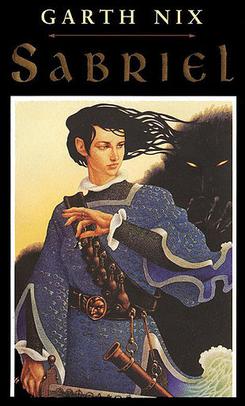
I had Garth Nix’s novel Sabriel on my reading list for so long, I forget where I heard about it. Then I made the happy discovery that the New York Public Library has an app that lets you check out e-books. This was the first one on my list that I could get, and I enjoyed it tremendously, so I tracked down the rest of the series. It was well worth the time.
Nix’s fantasy series is set in two neighboring countries. One is Ancelstierre, a country whose government and technology are similar to England in the 1910s. All along its northern border, there’s a great wall that separates Ancelstierre from its neighbor, the Old Kingdom.
The weather and the seasons are sometimes different on the other side of the wall, unaccountably so. Modern technology doesn’t work in the Old Kingdom, but magic does. And when the wind blows out of the north, sometimes strange things happen in the northern reaches of Ancelstierre. The Ancelstierran government officially denies the existence of magic, but their side of the border is a heavily fortified perimeter, designed to protect against anything malevolent that wanders across the wall, although some supernatural threats can’t be stopped by barbed wire or guns.
The hero, Sabriel, is a young woman studying at a boarding school in Ancelstierre, but by birth she’s a citizen of the other country. Her long-absent father is the Abhorsen, a powerful necromancer of the Old Kingdom. Necromancers are almost always evil, but the Abhorsen is the exception. Where most necromancers raise the dead for sinister purposes, the Abhorsen uses those dark arts to lay them to rest.
At least, that’s the way it’s always been. Until a strange messenger comes to Sabriel, bearing her father’s bells and sword: the tools of the trade for a necromancer. Something terrible has happened to him, and she has to cross into the Old Kingdom to find out what. And she has to do it soon, because if there’s no one to do the Abhorsen’s job, then the dead will rise, with terrible consequences for both realms.
Nix’s series has one of the most original and inventive magic systems I’ve come across, one that’s divided into two parallel sources of power. One is the Charter, an orderly system of runes that’s meant to describe, contain and encompass everything that exists in the world. Outside the Charter is Free Magic, a chaotic and dangerous force that people can tap into, but always at a price.
Necromancers like the Abhorsen derive their power from bells whose ringing can raise, bind or banish the dead. They can walk into Death, which is a vast, cold gray river that flows through a multilayered realm of nine gates, and speak to the spirits that reside there, whether ordinary ghosts or far more powerful and dangerous creatures from deeper in the realms of Death. They can send a spirit beyond the final gate from which no return is possible; or they can return them to Life in undead, monstrous form to do the necromancer’s bidding. Some of the greatest threats in the series are undead themselves, powerful sorcerers who refuse to relinquish their hold on life.
The entire Old Kingdom series is five books: after Sabriel, a two-part sequel, Lirael and Abhorsen; a prequel novel, Clariel, set several hundred years before the others; and just last year, Goldenhand, which connects the earlier books through the story of one major recurring villain. The first and the last were best, in my opinion. The main character of Lirael flirts with Mary Sue-dom, and Clariel is far more brutal and tragic than the others. But the series as a whole is inventive, entertaining, and no small feat, it manages to find some original ground in the well-trodden paths of sword-and-sorcery high fantasy.